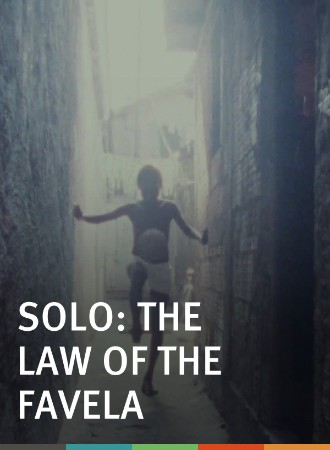
Solo, The Law of the Favela 1994
Distributed by First Run/Icarus Films, 32 Court St., 21st Floor, Brooklyn, NY 11201; 800-876-1710
Produced by Ymke Kreiken
Directed by Jos de Putter
VHS, color, 54 min.
Adult
Sociology, Latin American Studies
Date Entered: 11/09/2018
Reviewed by Orlando Archibeque, Auraria Library, University of Colorado at DenverThis compelling documentary about soccer in Brazil has been featured at a number of international film festivals, including the 1995 Cinema du Reel (Paris), the 1995 Philadelphia Festival of World Cinema, the 1996 Latin American Film Festival (London), the 1996 Bombay Film Festival, and the 1996 Nyon Film Festival. It won the Joris Ivens Award (named after the noted Dutch documentary filmmaker) at the 1994 International Documentary Film Festival in Amsterdam.
This is not your typical video about sports. The viewer will not learn much about the history of soccer in Brazil, nor about the many famous soccer players this country has produced, nor about how many World Cup competitions the country has won. Instead, this video is about soccer as the religion of Brazil. As one of the coaches in the video explains, "Soccer is the salvation of Brazil."
We are introduced to this religion by Dutch filmmaker, Jos de Putter, who focuses on two young boys, Anselmo and Leonardo. Both are eleven years old and live in the same favela (slum) outside Rio de Janeiro. The close friends hope to escape the violence, corruption, and poverty of the favela by becoming professional soccer players. Their ultimate goal is to play for the Brazilian national soccer team. The boys are obviously and painfully aware that the chances of becoming professional soccer players are slim, but they also believe that this may be the only way to escape the harsh life of the favela. To have any chance at all, their talent must first be recognized by coaches in the neighborhood leagues, then by player-development personnel in the richer and more prestigious soccer training schools. The next step is to secure (before they become teenagers) a contract that will pay not only for their soccer expenses (boots, uniforms), but also for their transportation, living, and schooling expenses. Needless to say, few make it this far.
The director makes extensive use of "real life" video. The camera follows the two friends as they play and hone their skills in the streets and playgrounds of the favela. We see them working as fishermen to earn money to pay for bus transportation and for soccer boots. We listen in on the discussions of coaches and player-development managers that will forever change the lives of these young boys and their families. Interspersed throughout the video are scenes of poor Brazilians watching television and cheering on the Brazilian soccer team during the 1994 World Cup Championship.
The documentary reaches its climax when one of the boys, Leonardo, is offered a contract to play for a prestigious soccer club. Accepting the offer means he will get paid for playing soccer, but it also means he must leave his family and his friend and playing-partner, Anselmo, behind.
The production qualities (audio, video, editing) are excellent, especially considering that the majority of the filming was done outdoors and in the slums.
This video is recommended for adult audiences. It is particularly well suited for colleges and universities offering courses in leisure studies or in the sociology, psychology, or history of sport.